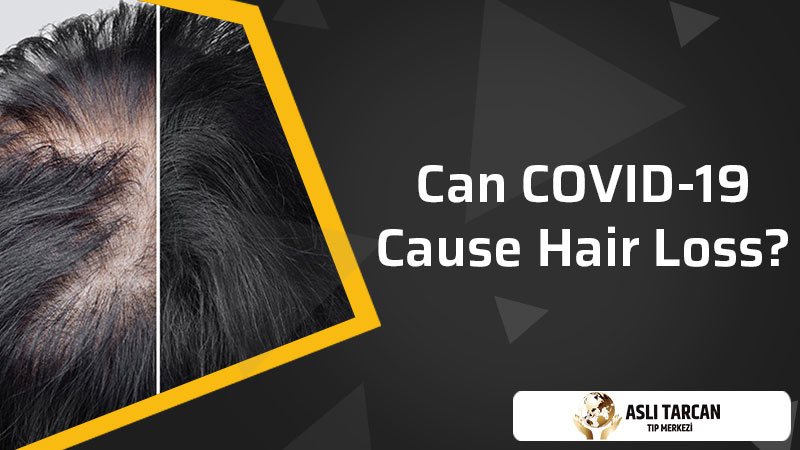Can COVID-19 Cause Hair Loss?
Can COVID-19 Cause Hair Loss? We’re now in the center of a pandemic caused by SARS-CoV-2, a new coronavirus. The illness is caused by this virus. COVID-19 is a virus that infects people. COVID-19 can cause a wide range of symptoms in those who become ill. People with this disease wonder can COVID-19 cause hair loss. People who have recovered from COVID-19 have reported hair loss. We’ll go into whether a SARS-CoV-2 infection will cause hair loss, and when to contact your doctor.
What Is The Conclusion Of The Research?
The question of can COVID-19 cause hair loss has been the subject of many researchers. In case studies, there have been several cases of hair loss as a result of COVID-19. As a result, it is unclear how common it is in the general population. In a small sample of 63 people, a November 2020 report looked at COVID-19 late-onset effects. Hair loss was recorded by 14 (24.1 percent) of the 58 participants in the study. The estimated time from the onset of COVID-19 symptoms to measurable hair loss was 58.6 days in this study. In five of the 14 participants, hair loss was overcome. Nine of the volunteers, however, were already feeling hair loss as they were interviewed.
Why Is It Possible That COVID-19 Causes Hair Loss?
After investigating the question of can COVID-19 cause hair loss, the reasons for this have emerged. The hair loss observed after COVID-19 is typical of a disease known as telogen effluvium (TE). Hair loss is said to be abrupt in people with TE. Hair comes out in big clumps much of the time, particularly while brushing or showering. 2 or 3 months following a triggering incident, the majority of people with TE experience significant hair loss. This usually only involves half of the scalp and lasts 6 to 9 months. Most people notice that their missing hair regrows during this period.
What is COVID-19’s relationship to this? A sudden infection with a fever is one of the possible causes of TE. Fever is one of the most common signs of COVID-19 infection. Another possible cause of TE is stress. Experiencing a disease like COVID-19 will undoubtedly be stressful on both the physical and emotional levels. Some people have developed TE as a result of the stress of quarantining.
What Is The TE Mechanism?
Hair goes through many stages of growth. When a stressor induces a large number of hairs to stop developing and enter the resting (telogen) process, this is known as TE. Hairs rest for 2 to 3 months in the telogen process before being shed from your scalp to make room for new hair growth. This is why TE hair loss occurs too long after a triggering incident, such as an infection or a time of extreme stress.
Is There A Connection Between Severe COVID-19 And Hair Loss?
The answer to the question of can COVID-19 cause hair loss is yes. It’s likely that extreme COVID-19 is linked to hair loss. However, the degree to which this is so, as well as the biochemical system that underpins it, are unknown at this time. 175 people hospitalized with COVID-19 were tested in a report published in May 2020. The researchers discovered that a large percentage of the patients (67%) had androgenic alopecia. It’s worth noting that the report didn’t have a test group.
In a report published in July 2020, 336 men hospitalized for COVID-19 and 1,605 men hospitalized without COVID-19 were compared for balding patterns. Men with the most conspicuous pattern of baldness were more likely to test positive for COVID-19, according to the report.
Demographic research conducted in November 2020 polled 43,565 people about their hair loss, underlying health problems, and COVID-19 status or result. Hair loss was observed to be linked with more serious COVID-19 illness on its own. It’s important to emphasize that there’s a scarcity of studies on this subject right now. Hair loss could be linked to COVID-19 risk, but further research is required to find out.
What Would You Do If You’re Losing Your Hair?
Now that you have learned the answer to the question of can COVID-19 cause hair loss, let’s see what you can do. Depending on the cause of your hair loss, your doctor can prescribe one of many remedies. Working to treat an underlying health condition that is causing hair loss may delay or stop your hair loss. If your prescription is causing hair loss, your doctor can recommend that you switch prescriptions or avoid taking it for a few months. To treat androgenic alopecia, your doctor can recommend medications or procedures. Here is a list of some of them:
- Finasteride: Finasteride is a drug that men can use to delay hair loss and promote new hair development.
- Spironolactone: Women may use spironolactone to help slow hair loss and increase hair thickness.
- Injections of corticosteroids: Some forms of hair loss, such as alopecia areata, can benefit from corticosteroid injections into areas of thinning hair or baldness.
- Hair transplants: A dermatologist or plastic surgeon extracts hair from one section of the head and transplants it to a region of baldness during a hair transplant.
What Should You Do At Home?
If you are someone who is investigating the question of can COVID-19 cause hair loss, you are experiencing this problem. There are a few things you can do at home to assist with hair loss as well. Often consult a doctor before beginning any at-home medication or supplement regimen. You should change the way of your life. Hair loss may be exacerbated by some maintenance activities. Try to stay away from stuff that is hard on your hair, such as:
- brushing your hair and dragging or tugging on it
- ponytails, hair extensions, and deep braids are examples of hairstyles that tug on the hair.
- perms and hot-oil therapies are examples of hair treatments that can damage the hair.
When Do You See The Doctor For Your Hair Loss?
Have an appointment with your doctor if you’re worried about your hair loss. Hair loss may be caused by several symptoms that suggest an underlying health problem that needs to be addressed. If you’re experiencing hair loss that has the following symptoms, see the doctor.
- comes on unexpectedly
- causes clumps of hair to come out
- resulting in patchy baldness
- is followed by scratching or tenderness on the scalp
-
Covid & Hair Loss Connection
As the Covid-19 pandemic continues, many people are dealing with unexpected side effects, including Covid & hair loss. While it is not yet known whether Covid-19 directly causes hair loss, there is evidence that the virus may be linked to an increase in hair shedding. Some researchers found that more than half of people with Covid-19 experienced some degree of hair loss. The most commonly reported type of hair loss was telogen effluvium, a condition in which hair follicles enter a resting phase and stop producing new strands. This type of hair loss is typically seen after a traumatic event such as surgery or a severe illness. It is also common in people who are experiencing emotional stress.

The connection Covid & hair loss is not yet clear, but it is likely related to the stress and anxiety caused by the pandemic. This stress can cause changes in hormone levels, which can affect the health of the hair follicles and lead to hair loss. It is important to take good care of your scalp and hair by using gentle products and avoiding harsh chemicals or heat-styling tools. If you are concerned about your hair loss, talk to your doctor or a dermatologist for advice about hair loss treatment.





